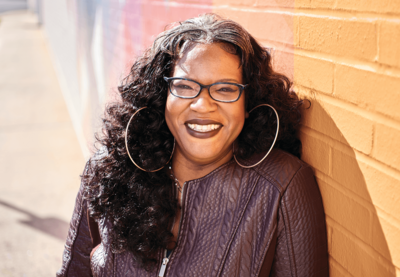Several of my colleagues have said, “I was born to teach,” and I’ve looked at them in awe—primarily because I know the same is not true for me. Mine was a long and circuitous road paved with many challenges, doubts and triumphs. What I can say with certainty, though, is I was born to be a learner.
I grew up in Plainfield, New Jersey. During my father’s childhood there in the 1960s, at the peak of the civil rights movement, protests for equality—grassroots movements—were taking place. Plainfield gained national attention as one of more than a hundred U.S. cities marked by racial unrest during the “Long, Hot Summer of 1967.” People of color were protesting to receive the political, social and economic rights promised by the U.S. Constitution. My parents and family were at the center of this social upheaval that would come to shape my worldview.
My father says that every generation has its own unique question. For those like him who grew up in the 1960s, that question was “Why?” and it demanded answers. “Why must we as Black people accept being treated as if we have no dignity?” and “Why are you, the government, failing by not giving us a seat at the table when we are dying in your battlefields and working in your industrial plants?” My family passed down to me the bravery to ask the tough questions and the thirst to find the answers. I believe that, without my knowing and without my permission, my family set me on the road to become a teacher.
I teach because I am a learner and I need to instill this same drive to learn and ask questions in my students. They must ask, “Why?” because it appears that this will be the question for their generation as well. Ask, investigate and advocate. I believe these skills should be taught in the classroom because when students embrace and master them, these skills will transcend the classroom.
Ask the compelling questions that lead to dialogue about how changes may be made for the common good. Ask if we are learning from the mistakes of our past or looking for avenues to ensure that all races, cultures and genders are fully represented. Investigate different perspectives, even if they conflict with one’s own. Investigate history because it teaches valuable lessons about what we, as a nation, have done right and have done wrong. Advocate for change and be the change agent who takes civic action to continue the work of those who have gone before. Advocate so those who have historically been disregarded are recognized.
This kind of inquiry and advocacy was honed in me from childhood. It was listening to my father and uncles enthusiastically debate in my grandmother’s kitchen. It was also listening to my Uncle Joe tell my grandmother he was going to protest a landfill being put in our neighborhood and her replying, “Have a good time!” It was receiving a picture book about Benjamin Banneker from Uncle Mike when every other child in second grade was learning about Martin Luther King Jr. And it was my father insisting my first chapter book was The Autobiography of Malcolm X instead of The Wizard of Oz.
My family instilled in me a love for learning, especially about history, my role in it and what it means to question the status quo. So I teach because it is my way of continuing for my students the legacy that my family passed to me—a legacy of empowerment from knowledge that leads to a future of possibilities for change.
Share Your Story
What motivates you to get up each morning and serve students in our nation’s schools? We want to hear from you. Send your 600-word submission for the “Why I Teach” column to lfjsubmissions@splcenter.org.
